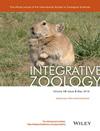Constitutive innate immune defenses in relation to urbanization and population density in an urban bird, the feral pigeon Columba livia domestica.
IF 3.5
1区 生物学
Q1 ZOOLOGY
引用次数: 0
Abstract
Urbanization processes modulate the immunological challenges faced by animals. Urban habitat transformations reshape pathogen diversity and abundance, while high population density-common in urban exploiter species-promotes disease transmission. Responses to urbanization may include adaptive adjustments of constitutive innate immune defenses (e.g. complement system and natural antibodies [NAbs]), which serve as first-line protection against infections. Here, we investigated associations of habitat urbanization and host population density with complement and NAbs in an urban bird, the feral pigeon Columba livia domestica. To do so, we employed the hemolysis-hemagglutination assay to analyze nearly 200 plasma samples collected across urbanization and pigeon population density gradients in five major cities in Poland. We found a negative association between urbanization score and hemagglutination (i.e. NAbs activity), but not hemolysis (i.e. complement activity), indicating either immunosuppression or adaptive downregulation of this immune defense in highly transformed urban landscape. Population density was not significantly related to either immune parameter, providing no evidence for density-dependent modulation of immune defenses. At the same time, there was a negative association of hemolysis with condition (scaled mass index), suggesting resource allocation trade-offs or contrasting effects of the urban environment on immune defenses and body condition. The results demonstrate that habitat structure can be an important factor shaping the immune defenses of the feral pigeon, although these associations were not mediated by variation in population density. Our study highlights the complexity of the links between immune defenses in wildlife and urbanization and reinforces the need for comprehensive ecoimmunological studies on urban animals.城市鸟类野鸽(Columba livia domestica)的先天性免疫防御系统与城市化和种群密度的关系。
城市化进程改变了动物所面临的免疫学挑战。城市栖息地的改变重塑了病原体的多样性和丰度,而高人口密度--在城市开发物种中很常见--促进了疾病的传播。对城市化的反应可能包括对构成性先天性免疫防御系统(如补体系统和天然抗体)的适应性调整,这些系统是抵御感染的第一道防线。在这里,我们研究了栖息地城市化和宿主种群密度与城市鸟类野鸽(Columba livia domestica)补体和天然抗体的关系。为此,我们采用溶血-血凝试验分析了在波兰五个主要城市采集的近 200 份血浆样本,这些样本跨越了城市化和鸽子种群密度梯度。我们发现,城市化得分与血凝(即 NAbs 活性)呈负相关,但与溶血(即补体活性)无关,这表明在高度转型的城市景观中,这种免疫防御功能要么受到了免疫抑制,要么出现了适应性下调。种群密度与这两种免疫参数都没有明显关系,因此没有证据表明免疫防御功能受密度影响。同时,溶血与身体状况(按比例质量指数)呈负相关,这表明资源分配权衡或城市环境对免疫防御和身体状况的对比效应。研究结果表明,栖息地结构可能是影响野鸽免疫防御能力的一个重要因素,尽管这些关联并不受种群密度变化的影响。我们的研究凸显了野生动物免疫防御系统与城市化之间联系的复杂性,并加强了对城市动物进行全面生态免疫学研究的必要性。
本文章由计算机程序翻译,如有差异,请以英文原文为准。
求助全文
约1分钟内获得全文
求助全文
来源期刊

Integrative zoology
ZOOLOGY-
CiteScore
6.40
自引率
12.10%
发文量
81
审稿时长
>12 weeks
期刊介绍:
The official journal of the International Society of Zoological Sciences focuses on zoology as an integrative discipline encompassing all aspects of animal life. It presents a broader perspective of many levels of zoological inquiry, both spatial and temporal, and encourages cooperation between zoology and other disciplines including, but not limited to, physics, computer science, social science, ethics, teaching, paleontology, molecular biology, physiology, behavior, ecology and the built environment. It also looks at the animal-human interaction through exploring animal-plant interactions, microbe/pathogen effects and global changes on the environment and human society.
Integrative topics of greatest interest to INZ include:
(1) Animals & climate change
(2) Animals & pollution
(3) Animals & infectious diseases
(4) Animals & biological invasions
(5) Animal-plant interactions
(6) Zoogeography & paleontology
(7) Neurons, genes & behavior
(8) Molecular ecology & evolution
(9) Physiological adaptations
 求助内容:
求助内容: 应助结果提醒方式:
应助结果提醒方式:


